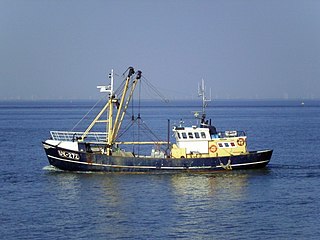Related Research Articles

The European Court of Justice (ECJ), formally just the Court of Justice, is the supreme court of the European Union in matters of European Union law. As a part of the Court of Justice of the European Union, it is tasked with interpreting EU law and ensuring its uniform application across all EU member states under Article 263 of the Treaty of the Functioning of the European Union (TFEU).
In European Union law, direct effect is the principle that Union law may, if appropriately framed, confer rights on individuals which the courts of member states of the European Union are bound to recognise and enforce.

R v Secretary of State for Transport was a judicial review case taken against the United Kingdom government by a company of Spanish fishermen who claimed that the United Kingdom had breached European Union law by requiring ships to have a majority of British owners if they were to be registered in the UK. The case produced a number of significant judgements on British constitutional law, and was the first time that courts held that they had power to restrain the application of an Act of Parliament pending trial and ultimately to disapply that Act when it was found to be contrary to EU law.

The EFTA Court is a supranational judicial body responsible for the three EFTA members who are also members of the European Economic Area (EEA): Iceland, Liechtenstein and Norway.
Flaminio Costa v ENEL (1964) Case 6/64 was a landmark decision of the European Court of Justice which established the primacy of European Union law over the laws of its member states.

The primacy of European Union law is a legal principle establishing precedence of European Union law over conflicting national laws of EU member states.
Van Duyn v Home Office (1974) C-41/74 was a case of the European Court of Justice concerning the free movement of workers between member states.
Nordsee Deutsche Hochseefischerei GmbH v Reederei Mond Hochseefischerei Nordstern AG & Co KG is a case referred to the European Court of Justice (ECJ) by a German arbitrator by virtue of Article 267 of the Treaty on the Functioning of the European Union. This article gives the "Courts or Tribunals" of Member States the power to refer matters involving the interpretation or application of European Union law to the ECJ. It was held in this case that the ECJ could not rule on questions referred to it by an arbitrator because an arbitral body is not a court or tribunal of a Member State as defined in Article 234.
The European Union's (EU) Treaty of Lisbon, in force since 1 December 2009, requires the EU to accede to the European Convention on Human Rights (ECHR). Article 6 of the consolidated Treaty on European Union states "The Union shall accede to the European Convention for the Protection of Human Rights and Fundamental Freedoms. Such accession shall not affect the Union's competences as defined in the Treaties." The EU would thus be subject to its human rights law and external monitoring as its member states currently are. It is further proposed that the EU join as a member of the Council of Europe now that it has attained a single legal personality in the Lisbon Treaty.

The Court of Justice of the European Union (CJEU) is the judicial branch of the European Union (EU). Seated in the Kirchberg quarter of Luxembourg City, Luxembourg, this EU institution consists of two separate courts: the Court of Justice and the General Court. From 2005 to 2016, it also contained the Civil Service Tribunal. It has a sui generis court system, meaning 'of its own kind', and is a supranational institution.
Françoise Gravier v City of Liège (C-293/83) was an important freedom of movement case in European law concerning non-discrimination in access to vocational education. It held that an education institution may not discriminate against students in terms of the fees they charge on grounds of nationality.
Vatsouras and Koupatantze v ARGE is a case decided by the European Court of Justice which deals with the concepts of 'worker' and 'social assistance' under European Union law.
Reference for a Preliminary Ruling in the Criminal Proceedings against Bernard Keck and Daniel Mithouard (1993) C-267/91 is an EU law case, concerning the conflict of law between a national legal system and European Union law. The Court found that "selling arrangements" did not constitute a measure having equivalent effect to a quantitative restriction on trade between Member States of the European Community, as it was then. As a result, the 'discrimination test' was introduced to identify such selling arrangements.

European Court of Justice (ECJ)
Opinion 2/13 (2014) is an EU law case determined by the European Court of Justice, concerning the accession of the European Union to the European Convention on Human Rights, and more generally the relationship between the European Court of Justice and European Court of Human Rights.
The Statute of the Court of Justice of the European Union contains the main EU law rules on how the Court of Justice of the European Union should function. Founded in 1951, The CJEU sits in Luxembourg, and it operates in two sections: The European Court of Justice (ECJ) and the General Court (GC). A direct component of the EU, the five main goals of the CJEU are:
Unión de Pequeños Agricultores v Council of the European Union (2002) C-50/00 P is an EU law case, concerning a judicial review of a regulation adopted by the European Union. In this case, the European Court of Justice declined to accept the preliminary opinion of the Advocate General, Francis Jacobs.
Srl CILFIT v Ministry of Health (1982) is an EU law case, concerning preliminary references to the Court of Justice of the European Union.
Pringle v Government of Ireland (2012) C‑370/12 is a European Union law case, which held the European Stability Mechanism (ESM) was lawful.
Real Madrid Club de Fútbol, AE v EE, Société Éditrice du Monde SA is an ongoing case of the European Court of Justice (ECJ). The case, brought by the Spanish football club Real Madrid, alleges that French newspaper Le Monde defamed the club by publishing an article linking the club to a doctor known for doping. Although Spanish courts have awarded the football club damages, French courts have refused to uphold their judgment in the name of protecting freedom of the press. The French courts have sent a request for a preliminary ruling from the ECJ on whether the principle of mutual recognition of judgments outweighs the freedom of the press and freedom of expression. The ECJ will seek to reconcile the decisions of two national courts and determine the role of rights within the principle of mutual recognition.
References
- ↑ Craig, Paul; de Búrca, Gráinne (2011). EU law: text, cases, and materials (5th ed.). Oxford: Oxford University Press. p. 482. ISBN 9780199576999.
- ↑ An "undertaking" in the EU is a company, partnership or business firm. See TFEU Arts 101 & 102.
- 1 2 Case C-454/06, Opinion of Advocate General Kokott delivered on 13 March 2008. pressetext Nachrichtenagentur GmbH v Republik Österreich (Bund), APA-OTS Originaltext-Service GmbH and APA Austria Presse Agentur registrierte Genossenschaft mit beschränkter Haftung
- ↑ Case 244/80 Pasquale Foglia v. Mariella Novello paragraph 18.
- ↑ Otherwise, an application to the ECJ may take a year or so before the question is answered.
- ↑ "European Communities Act 1972: Section 2", legislation.gov.uk , The National Archives, 1972 c. 68 (s. 2)
- ↑ "Civil Procedure Rules 1998, Part 68: References to the European Court". Archived from the original on 15 February 2012. Retrieved 23 February 2022.
- ↑ Case 107-76 Hoffmann-La Roche AG v Centrafarm Vertriebsgesellschaft Pharmazeutischer Erzeugnisse mbH
- ↑ Case C-337/95 Parfums Christian Dior SA and Parfums Christian Dior BV v Evora BV
- ↑ Limante, Agne (2016). "Recent Developments in the Acte Clair Case Law of the EU Court of Justice: Towards a more Flexible Approach". JCMS: Journal of Common Market Studies. 54 (6): 1384–1397. doi:10.1111/jcms.12434. S2CID 148202834.
- ↑ Case C-24/92 Corbiau v Administration des Contributions, paragraph 15.
- ↑ Case C-54/96 Dorsch Consult Ingenieurgesellschaft mbH v Bundesbaugesellschaft Berlin mbH
- ↑ Case C-53/03 Synetairismos Farmakopoion Aitolias & Akarnanias (Syfait) and Others v GlaxoSmithKline plc and GlaxoSmithKline AEVE
- ↑ Case 146-73 Rheinmühlen-Düsseldorf v Einfuhr- und Vorratsstelle für Getreide und Futtermittel
- ↑ Case 246/80 C. Broekmeulen v Huisarts Registratie Commissie
- ↑ InfoCuria, Case C‑76/16 INGSTEEL spol. sro and Metrostav as v Úrad pre verejné obstarávanie (Slovak Public Procurement Regulatory Authority), delivered 13 July 2017, paragraph 50.
- ↑ "The Protocol on Ireland/Northern Ireland Contents. Chapter 11: Implementation, application, supervision and enforcement, and other provisions (Articles 12, 13, 16, 17 and 19)". British Parliament. Retrieved 31 December 2020.
- ↑ Publications Office of the European Union. "Preliminary ruling proceedings – recommendations to national courts". EUR-Lex.europa.eu . Retrieved 5 September 2024.